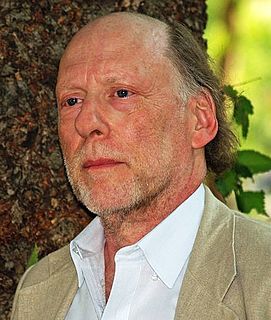A Quote by Eric Hoffer
Perhaps our originality manifests itself most strikingly in what we do with that which we did not originate. To discover something wholly new can be a matter of chance, of idle tinkering, or even of the chronic dissatisfaction of the untalented.
Related Quotes
The whole language of nature informs us, that in animated beings there is something above our powers of investigation; something which employs, combines, and arranges the gross elements of matter - a spark of celestial fire, by which life is kindled and preserved, and which, if even the instruments it employs are indestructible in their essence, must itself, of necessity, be immortal.
The further limits of our being plunge, it seems to me, into an altogether other dimension of existence from the sensible and merely understandable world. Name it the mystical region, or the supernatural region, whichever you choose. So far as our ideal impulses originate in this region (and most of them do originate in it, for we find them possessing us in a way for which we cannot articulately account), we belong to it in a more intimate sense than that in which we belong to the visible world, for we belong in the most intimate sense wherever our ideals belong.
Most things are forgotten over time. Even the war itself, the life-and-death struggle people went through, is now like something from the distant past. We're so caught up in our everyday lives that events of the past, like ancient stars that have burned out, are no longer in orbit around our minds. There are just too many things we have to think about every day, too many new things we have to learn. New styles, new information, new technology, new terminology ... But still, no matter how much time passes, no matter what takes place in the interim, there are some things we can never assign to oblivion, memories we can never rub away. They remain with us forever, like a touchstone. And for me, what happened in the woods that day is one of these.
The general notions about human understanding...which are illustrated by discoveries in atomic physics are not in the nature of things wholly unfamiliar, wholly unheard of, or new. Even in our own culture, they have a history, and in Buddhist and Hindu thought a more considerable and central place. What we shall find is an exemplification, an encouragement, and a refinement of old wisdom.
I think that, regardless of our culture, age, or even personal handicaps, we can still strive for something exceptional. Why not expand our sights instead of restricting our lives and accepting the lowest common denominator of a dormant existence? Faith. . . will permit us to take a chance on a new path, perhaps different from the one we now follow. It may be surprising where it leads.
There is a wonderful book called "Gandhi's Truth," by Erik Erikson, the psychologist. It is a great book. And I remember reading that and thinking about this connection between what we think in our personal lives and how that manifests itself in our politics. Those are two books, just off the top, that I think are sort of representative of reading that I did at that time. I never get a chance to read anymore.
The power of perpetuating our property in our families is one of the most valuable and interesting circumstances belonging to it, and that which tends most to the perpetuation of society itself. It makes our weakness subservient to our virtue; it grafts benevolence even upon avarice. The possession of family wealth and of the distinction which attends hereditary possessions (as most concerned in it,) are the natural securities for this transmission.
The truth of literature and art has always been granted (if it was granted at all) as one of a "higher" order, which should not and indeed did not disturb the order of business. What has changed in the contemporary period is the difference between the two orders and their truths. The absorbent power of society depletes the artistic dimension by assimilating its antagonistic contents. In the realm of culture, the new totalitarianism manifests itself precisely in a harmonizing pluralism, where the most contradictory works and truths peacefully coexist in indifference.
Stuff doesn't matter - boats, cars, fancy things don't matter. What matters, what will matter to me, is the love of the people around me, and did I take a chance? Did I seize an opportunity to do something for people with the talents that I was lucky enough to be given? Did I make a difference in the lives of people who needed me?



































